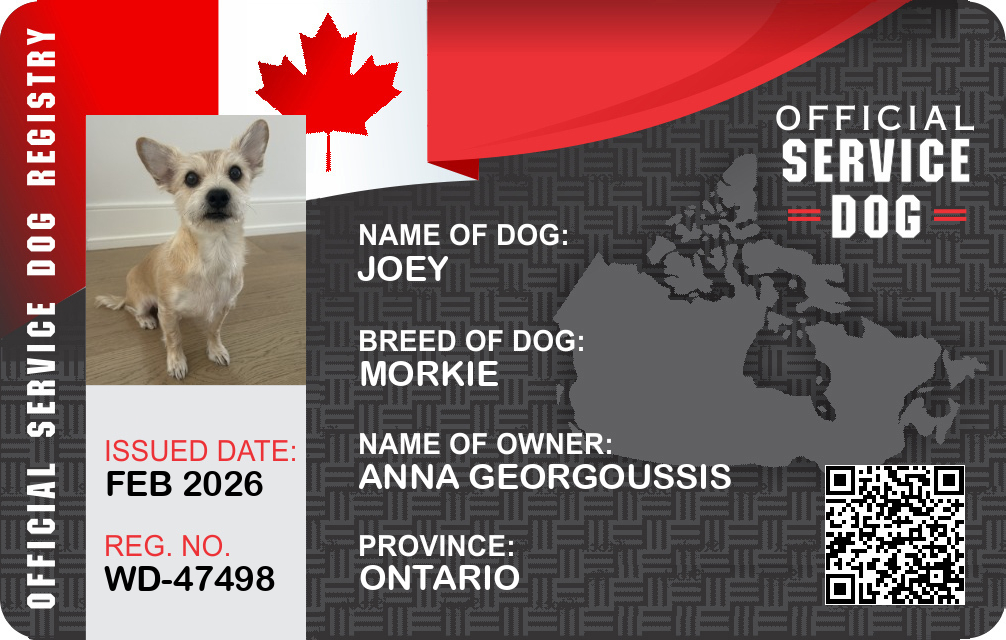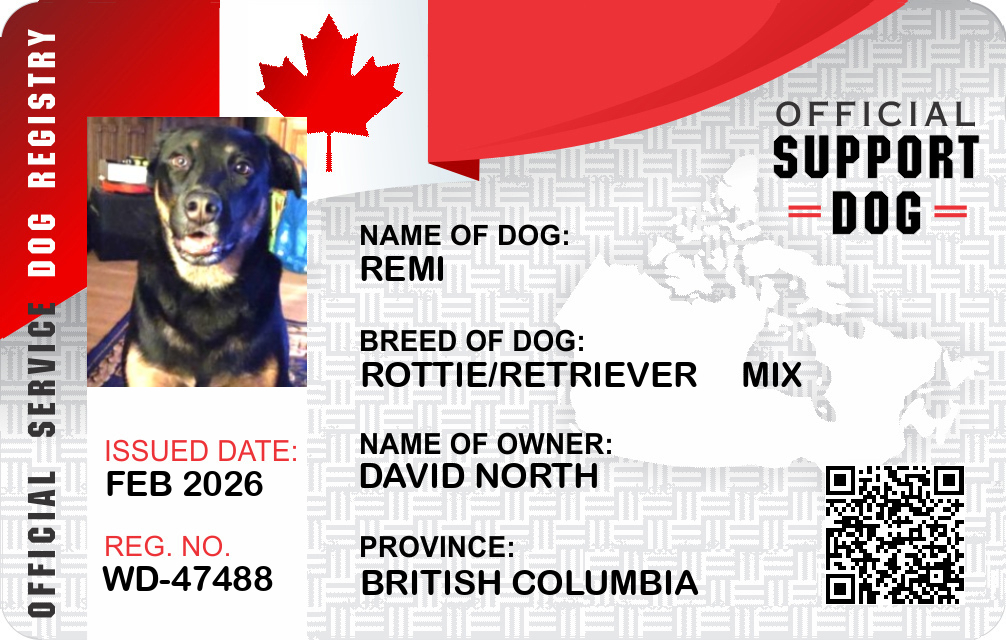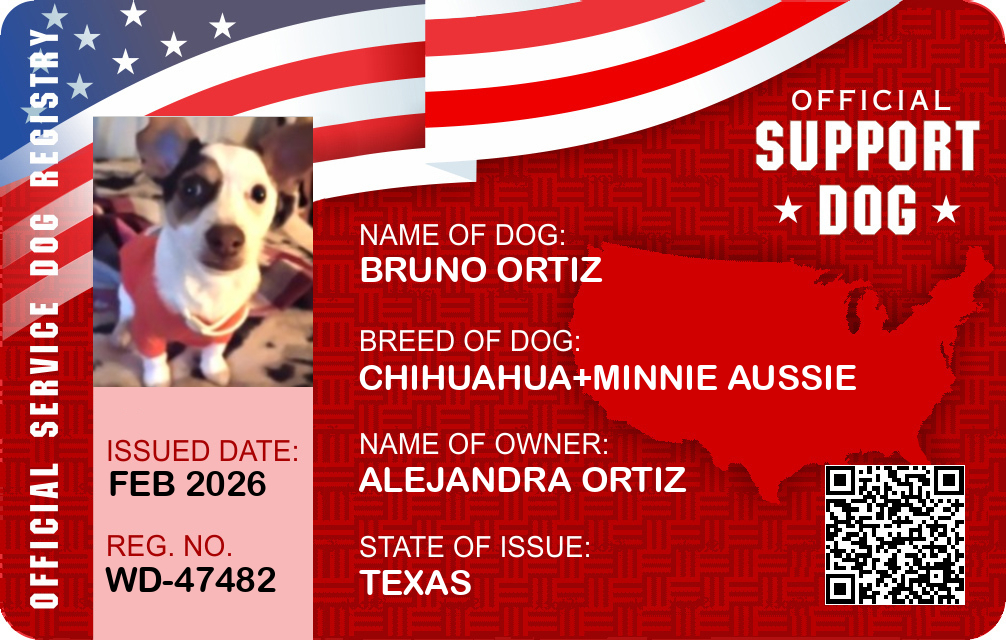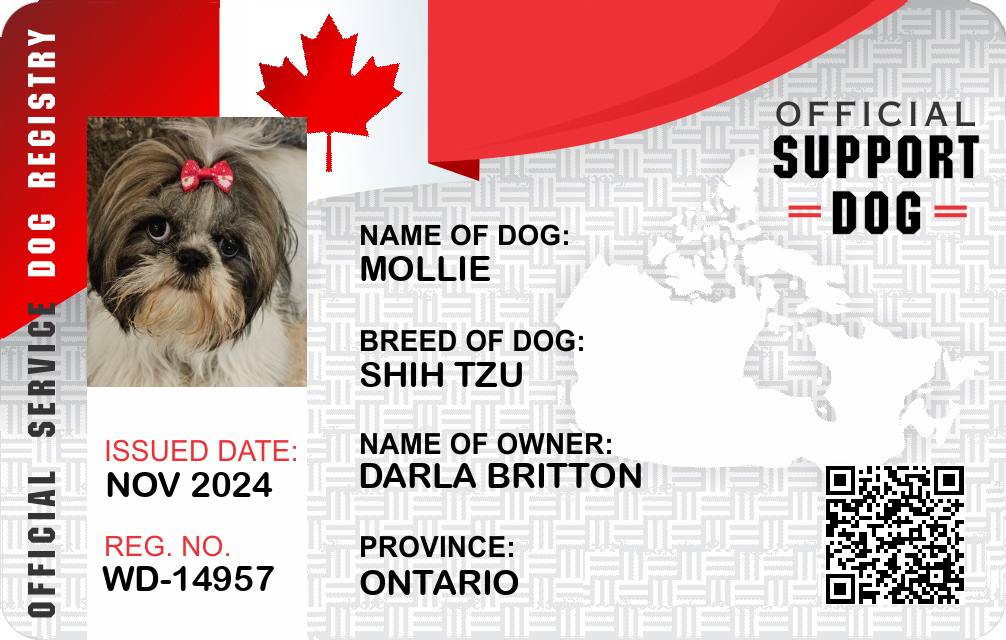Illinois Service Dog Laws
Get Your Documents
Example State Cards

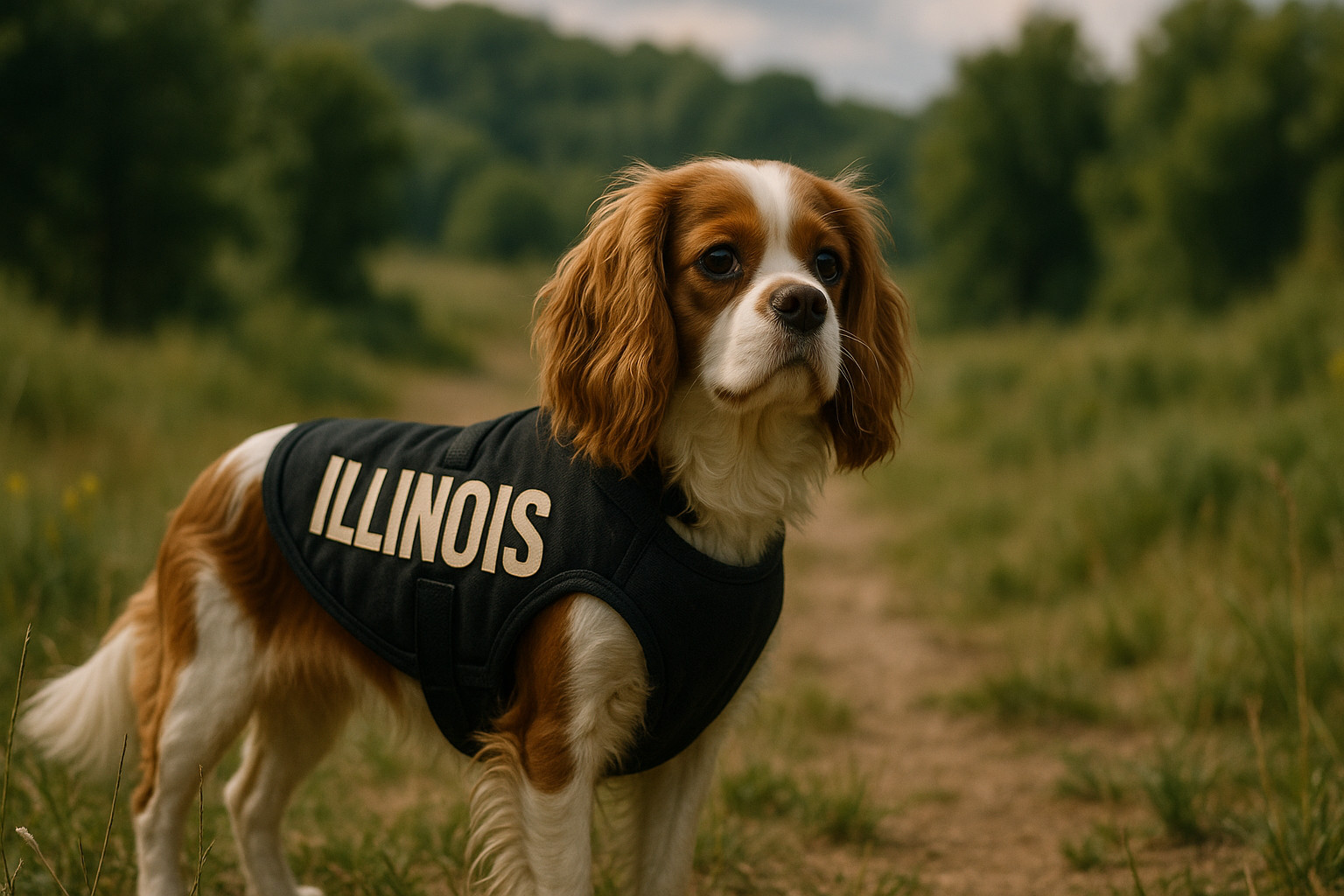
Overview of Service Dog and Legal Definitions in Illinois
What is a Service Dog?
Under both federal and Illinois state laws, a service dog is defined as a dog that is specifically trained to perform tasks that are directly related to the handler’s disability. These tasks could include guiding individuals who are blind, alerting individuals who are deaf, pulling a wheelchair, alerting and protecting someone having a seizure, or reminding a person with mental illness to take prescribed medications. The primary distinction that sets service dogs apart is their task-trained functionality that assists with a disability, making them vital tools for independence for their handlers.
How Service Dogs Differ from Other Types of Assistance Animals
Service dogs are distinct from other types of assistance animals, such as emotional support animals (ESA) and therapy dogs. While ESA provide comfort and companionship, they do not perform tasks to mitigate their owner’s disabilities and do not have the same access rights under the Americans with Disabilities Act (ADA). Therapy dogs, on the other hand, are trained to provide comfort in therapeutic settings such as hospitals or nursing homes but are not trained to assist individuals with disabilities specifically. Thus, while these animals serve meaningful roles, only service dogs have full public access rights under federal law.
Key Federal Laws Affecting Service Dogs (e.g., ADA, FHA, ACAA)
Several key federal laws govern the rights and responsibilities surrounding service dogs, each with its specific focus. The Americans with Disabilities Act (ADA) is the most comprehensive and influential, ensuring that individuals with disabilities accompanied by service dogs have unrestricted access to public places, including restaurants, hotels, and stores. The Fair Housing Act (FHA) protects individuals with disabilities from discrimination in housing, allowing them to keep service dogs even in properties where pets are not typically permitted. The Air Carrier Access Act (ACAA) ensures that service dogs can accompany their handlers on airplanes without any additional fees, emphasizing the importance of accessibility in transportation.
State-Specific Service Dog Laws in Illinois
Housing Rights and Responsibilities
In Illinois, tenants with disabilities are protected by both the FHA and state-specific regulations that provide similar protections and expanded enforcement options. Landlords in Illinois must allow service dogs, regardless of their pet policies, and cannot charge pet fees or deposits for these animals. However, tenants remain liable for any damage caused by the service dog beyond normal wear and tear, making responsible ownership crucial.
Public Access and Accommodation
Public spaces in Illinois are legally required to grant access to individuals with service dogs, aligning with ADA requirements. This access includes all areas where the public is allowed, such as restaurants, theaters, schools, and libraries. Business owners cannot demand documentation for the dog and are only allowed to ask two questions: if the dog is a service animal required because of a disability, and what task the dog has been trained to perform. They are prohibited from inquiring about the handler’s disability.
Transportation and Travel Rules
Beyond the general public access delineated by the ADA, Illinois also adheres to federal standards as set by the ACAA for air travel, ensuring that service dogs can accompany their handlers on all flights without additional fees. For public transportation within the state, service dogs are permitted on buses, trains, and taxis, provided they are under the control of their handler. Illinois statutes reinforce the protection of these rights and prohibit any additional charges for the use of service dogs in this context.
Employment and Workplace Considerations
Under the ADA and the Illinois Human Rights Act, employers are required to make reasonable accommodations for employees with disabilities, which includes allowing service dogs in the workplace. Employers can ask for documentation of the employee’s disability and the need for the service dog but cannot request documentation related to the dog. The job applicant or employee must be otherwise qualified to perform the essential functions of the job, with or without the constancy of their service dog, to warrant these accommodations.
Documentation, Requirements, and Processes in Illinois
Service Dog Documentation and Who Can Issue It
While service dogs are not required to be registered or certified by any specific entity, the need for reliable documentation becomes more relevant in contexts like housing and employment. In these cases, disability verification forms or letters from healthcare professionals may suffice, reinforcing the legitimate need for a service dog for disability management. This documentation should come from a licensed healthcare provider familiar with the handler’s disability and the necessary role of the service dog.
Landlord, Business, and Provider Verification Rules
Verification in Illinois is limited in scope, primarily focusing on the validity of the disability and necessity of the service dog rather than the dog’s training certifications or registry. Landlords and businesses are entitled to this information, yet they must respect the privacy of the individual by not inquiring into the nature or extent of the disability beyond what is necessary to assess accommodation compliance.
Rights, Limitations, and Legal Risks
Rights Service Dog Handlers Have in Illinois
Service dog handlers in Illinois are granted extensive rights that aim to facilitate extensive public access, housing, transportation, and workplace accommodations. These rights emphasize integration and equal treatment, allowing individuals with disabilities to engage more fully in all aspects of daily life with the assistance of their service dogs.
Limits on Service Dog Protections and Common Restrictions
While the protections for service dog owners are robust, there are defined limits to their application. Service dogs can be excluded if they are not housebroken, out of control, or disruptive to the extent that they fundamentally alter the nature of the services provided. Additionally, religious institutions may have more leeway in deciding whether to accommodate service animals.
Penalties for Fraud or Misrepresentation
Illinois enforces strict penalties for the fraudulent representation of pets as service dogs. This includes fines for those caught attempting to misrepresent their animals. Misrepresenting a pet as a service animal undermines the legitimacy of actual service dogs and the rights of their handlers, thus authorities take violations seriously.
Practical Guidance for Service Dog Handlers in Illinois
How to Qualify for a Service Dog Legitimately
To qualify for a service dog, individuals must first have a disability as defined by the ADA. They should consult with healthcare providers to determine if a service dog would mitigate their challenges. From there, they can work with professional trainers to develop a dog capable of meeting their specific needs, ensuring both the legitimacy and effectiveness of the service dog’s assistance.
How to Talk to Landlords, Airlines, and Employers
When engaging with landlords, airlines, and employers, clear communication and documentation are key. Having up-to-date letters from healthcare providers who confirm the necessity of the service dog can smooth interactions, as can being prepared to discuss the tasks the dog is trained to perform without revealing private health details.
Summary of Service Dog Laws in Illinois
In summary, service dog handlers in Illinois benefit from a blend of strong federal and state laws ensuring extensive rights and access, with an emphasis on integration and equal opportunity. Handlers must navigate these regulations with a balanced approach, respecting the responsibilities that accompany these rights to foster understanding and compliance in different sectors of life.
- Service dogs are distinct from ESA and enjoy broader public access rights.
- Under the ADA, Illinois service dog handlers can access public spaces, live in housing where pets are restricted, and travel with their dogs.
- Employers must reasonably accommodate service dogs, provided the employee is qualified for their role.
- Service dogs must be housebroken and well-managed; they may be excluded for disruptive behavior.
- In Illinois, misrepresentation of pets as service animals can lead to fines and penalties.
- Handlers should maintain documentation from healthcare providers to reinforce their rights when necessary.
- Effective communication with landlords and businesses helps ensure successful accommodation and avoidance of disputes.
By adhering to these guidelines and being vigilant about their responsibilities, service dog handlers in Illinois can improve their quality of life and maintain their rights while avoiding common legal pitfalls.
Get Your Documents
Example State Cards





